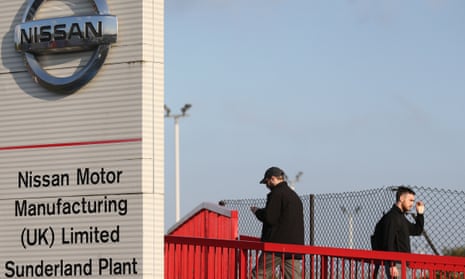A dark cloud of anxiety lifted over Sunderland with the news that Nissan would build two new models at its cathedral of car manufacturing. The Japanese car company’s threat that it could quit the region over Brexit had, like the referendum itself, left an open wound in Sunderland.
Outside the Tesco Extra behind the Stadium of Light, shoppers greeted the news with joy, relief and a dash of scepticism. “I think there’s been some subsidies or guarantees from the government, but it’s fantastic news for the area,” said Paul Lancaster. “It’s what it needs, because without Nissan the area would have nothing. It would die.”
His wife, Sandra, described the news as a “boost of confidence” for the region. A remain voter, Sandra said she was shocked by the scale of the leave vote in Sunderland, given Nissan’s importance. “It was a ridiculous vote. I was dismayed, disgusted,” she said.
Few of the city’s politicians, voters or business leaders truly believed Nissan’s threat that it could leave if it did not receive urgent guarantees from Theresa May. After all, it is the most efficient car factory in Europe, producing 115 cars an hour – half a million a year – and is the home of Qashqais, Jukes, Notes, Leafs, Infiniti Q30s and now the new X-Trail. Uprooting those finely tuned production lines to Spain or Russia, where it has other factories, was almost unthinkable. “It is too big to leave,” was a common view on the doorstep.
Nevertheless, the possibility of Nissan halting investment in the Washington plant, where it employs 7,000 workers and supports 27,000 more in the supply chain, was enough to give some city leaders sleepless nights.
“It had the potential to put the city back into the stone ages,” said one politician, who declined to talk on the record. Political leaders feared that, if Nissan was seen to be preparing an exit strategy, many big firms would be put off moving to the sprawling new international advanced manufacturing park (IAMP) being built to the north of the firm’s plant.
That, in turn, would deal a major blow to the £117m New Wear crossing, designed to better connect Nissan and manufacturing firms to Sunderland’s port, once home to the world’s biggest shipbuilding firms. The knock-on economic effect for the port could also have been significant.
One politician, who declined to talk on the record, spelled out an apocalyptic vision: “If Nissan is in the state of withdrawal, how many people are going to sign up to be next to a big, empty factory where Nissan once stood? You would be counting more tumbleweed than jobs.”
Nissan, the biggest private-sector employer in the north-east, is used to getting what it wants. The RAF base at Catterick, North Yorkshire, was once called upon to rescue a shipment of essential components from a ship that was unable to dock during a huge storm in the North Sea. After one phone call from Nissan bosses, a rescue helicopter was on its way. The car giant paid for the fuel.
Now Nissan is understood to be seeking to build its own gasification plant to provide low-cost energy at the Washington site, a development that would deepen its roots in the north-east. Paul Watson, the leader of Sunderland city council, said he was seeking to smooth the way for the deal, which would be “crucial” for the car plant’s future.
Watson admitted he had been concerned about the fate of the plant, but said he believed that, “given a level playing field”, Nissan would stay put. “Over the past 30 years, when we’ve got stuck into reinventing the economy and the region, recently we’ve grown more confident in ourselves,” he said. “Nissan and other firms are here because it’s good for them to be here.”
Julie Elliott, the Labour MP for Sunderland Central, was more circumspect. “I wholeheartedly welcome the announcement from Nissan that two new vehicles will be built at the Sunderland plant, but it’s only half a sigh of relief for the city,” she said.
Tens of thousands of jobs in Sunderland, and more than 100,000 in the north east, remain at risk from the possible introduction of trade tariffs, Elliott warned. Even if Nissan was covered by a deal protecting Britain’s booming motor industry, many companies in its supply chain would still be vulnerable: “There are many, many companies in Sunderland and beyond that export massively and import raw material from Europe who are not covered by any sectoral deal.”
Back outside Tesco, May Robson, a recently retired office manager, said she didn’t vote in the referendum due to health problems, but that Nissan’s “political threat” would not have swayed her either way. “To me, Nissan saying they would leave was a kneejerk reaction. It felt like a political threat. I’m pleased today, because we need employment and we would lose far too much without Nissan,” she said.
But the city is far bigger than one company, Robson said, and could recover as it did from the closure of the coalmines and shipyards in decades past. “We should leave the EU. I’m old and I know from the days before the common market that we did OK, we did fantastic, and we can go back to that,” she said.
“The mines, sadly, had to go. Shipbuilding we didn’t need as much. We’ve got to move with the times and now we’ve got technology. What we lost before we can gain in other ways.”
Mike Jenning, a leave voter, said he thought Nissan leaving was a “distinct possibility”, but that had not been a factor in his vote. “Nissan didn’t affect my vote, because I’ve never been a believer in the EU anyway. Even the first vote [in 1975], I didn’t want to join,” he said. “I think, longer term, if Nissan wasn’t getting the deals to the European market, the efficiency of the plant becomes irrelevant. But I’m pleased for the area. It’s a good advert for the workforce.”
